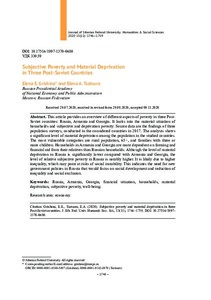Subjective Poverty and Material Deprivation in Three Post-Soviet Countries
Скачать файл:
URI (для ссылок/цитирований):
https://elib.sfu-kras.ru/handle/2311/137745Автор:
Grishina, Elena E.
Tsatsura, Elena A.
Гришина, Е.Е.
Цацура, Е.А.
Дата:
2020-11Журнал:
Журнал Сибирского федерального университета. Гуманитарные науки. Journal of Siberian Federal University. Humanities & Social Sciences;2020 13 (11)Аннотация:
This article provides an overview of different aspects of poverty in three Post-Soviet countries: Russia, Armenia and Georgia. It looks into the material situation of households and subjective and deprivation poverty. Source data are the findings of three population surveys, conducted in the considered countries in 2017. The analysis shows a significant level of material deprivation among the population in the studied countries. The most vulnerable categories are rural population, 65+, and families with three or more children. Households in Armenia and Georgia are more dependent on farming and financial aid from their relatives than Russian households. Although the level of material deprivation in Russia is significantly lower compared with Armenia and Georgia, the level of relative subjective poverty in Russia is notably higher. It is likely due to higher inequality, which may point at risks of social instability. This indicates the need for new government policies in Russia that would focus on social development and reduction of inequality and social exclusion В статье рассматриваются различные аспекты бедности в трех постсоветских странах: России, Армении и Грузии. Исследуется материальное положение
домохозяйств, показатели субъективной и деривационной бедности. Источником
данных послужили обследования населения, проведенные в указанных странах
в 2017 г. В результате исследования был выявлен существенный уровень материальных деприваций населения в рассматриваемых странах. Наиболее уязвимыми
являются сельские жители, лица в возрасте 65+, а также семьи с тремя и более
детьми. В Армении и Грузии домохозяйства в большей степени зависят от доходов от личного подсобного хозяйства и помощи родственников. Несмотря на то
что уровень материальной депривации в России существенно ниже, чем в Армении
и Грузии, уровень относительной субъективной бедности в России существенно
выше, что может быть обусловлено повышенным уровнем неравенства в России
и может свидетельствовать о рисках социальной нестабильности. Это указывает
на необходимость принятия в России дополнительных мер государственной политики, направленных на социальное развитие, сокращение неравенства и социальной исключенности.

